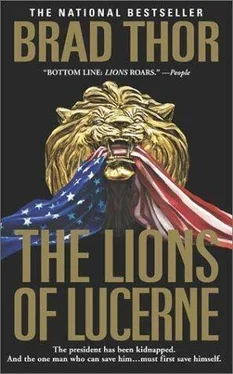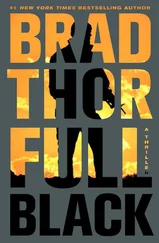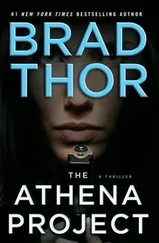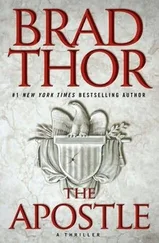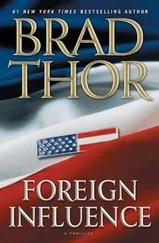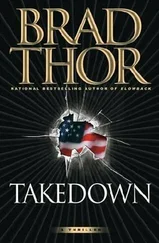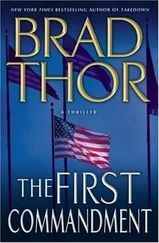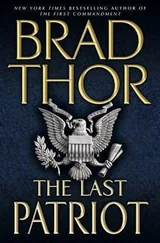He didn’t know how long he had been in the shower, but it was long enough for the hot water to start running out. Alexandria’s older buildings had their charm, but they also had their drawbacks. Scot climbed out, shaved, and dried his hair. Crossing to his bedroom, he put on a light gray suit, white shirt, and blue tie. Hungry and knowing he shouldn’t disturb anything in the kitchen, Scot remembered he had a box of granola bars in a hall closet. As he passed the living room, he noticed the caller ID box was lying on the floor, blinking. It showed one new call.
When he depressed the Call List button on the display, a number came up that Scot immediately recognized as being one at the Secret Service main office. According to the time, it had come in while he was in the shower.
By following the phone cord, he found the base station for his cordless. He hit the intercom button and was able to track down the handset, which was buried beneath one of the wayward couch cushions. Scot dialed his voice mail. It was Director Jameson. “Agent Harvath, this is the director. I have absolutely no idea what is going on or how the media got ahold of this thing so fast, but you have a lot of explaining to do. I am sending a car for you, and you’d better be there.”
The media? I’ve got some explaining to do? What was the director talking about? Scot waded through the sea of upturned items in his living room and turned on his TV. It was tuned to a local channel, and the image of a female reporter standing in a wooded area with police, state trooper, and rescue vehicles in the background appeared on the screen.
The reporter was speaking, and Scot turned up the sound to hear what she was saying. “…by two joggers early this morning. Apparently the victims had both been shot in the back of the head with a large-caliber weapon. While police say they have no leads on the killer, the FBI’s mobile crime lab appeared on the scene moments ago, and we will keep you informed of any developments. Back to you in the studio.”
What is going on? Scot furiously switched channels until he found another live shot from the same scene. The reporter was saying, “Yes, Jean, it is indeed a tragic day for the White House, as if their problems weren’t already bad enough. To compound the feelings of loss President Rutledge’s staff must already be experiencing, they now must add to it the murder of the assistant to the White House social secretary, Natalie Sperando, whose body, along with that of a currently unidentified man, was found early this morning by joggers in rural Maryland. Both victims were shot once in the back of the head with what police are saying was a large-caliber weapon, most likely a handgun.
“While authorities are not speculating as to the motive for the murders, no possibilities are being ruled out at this time. Moments ago the FBI mobile crime lab arrived on the scene-”
Scot turned off the TV. The nausea was returning, and he fought it down. Two more people who had trusted him were dead, but how? And why Natalie, of all people? Scot was overwhelmed with grief. She had been such a good friend. What happened? Shaw had told him that they had made it to the safe house. Could they have been followed? Both of them shot with a large-caliber weapon- Before he could finish the thought, Harvath ran toward his bedroom.
This room had been tossed as well, but now Scot didn’t care about preserving the scene. He needed to find his sidearm. Frantically, he tore apart the already annihilated room. Why had he left his pistol behind last night? Why hadn’t he taken it with him?
As Scot continued to search, he caught a flash of light out of the corner of his eye. He thought it was his head playing tricks on him and tried to ignore it. He went back to searching for the gun. He was on his hands and knees now, throwing pieces of clothing over his shoulder in a mad attempt to recover the SIG. The light came back. Harvath stopped searching. He looked up at the repeating colors of red, blue, red, blue, along the wall and realized they were coming from outside.
Keeping low, he scrambled toward the window and peered out through the partially open blinds. Pulling up to the curb below were several government favorites: dark-colored Ford Crown Victorias with suited drivers, which belonged to either the FBI, the Secret Service, or both. There were also several police cars.
My God, thought Harvath, they must think somehow that I am responsible for André’s and Natalie’s murders and are here to arrest me. All things considered, Harvath was also willing to bet that the gun used to commit the crime would turn out to be his missing SIG-Sauer.
While Scot was a stand-up guy, all for telling the truth and cooperating, something told him that now wasn’t the time to go gentle into that good night. He needed some answers first.
Trying to push the shock of Natalie’s and André’s murders from his mind, Scot grabbed his jeans from where he’d left them on the bathroom floor and transferred everything into the pockets of the trousers he was now wearing. He threw on his trench coat, stepped out, and locked the door to the apartment behind him. Turning to his left, he opened the door to the fire stairs and started down, careful not to make any noise.
As Scot moved down the last flight of stairs and pushed open the door to the basement, he realized that a little-known feature of his building was about to pay off big time. He was glad he had done his homework.
The old apartment building Harvath lived in, as well as all of the other buildings along his block, had been owned and built by the same wealthy Virginia family. The wife had been quite the eccentric and hadn’t wanted to deal with coal-truck deliveries disrupting her rather erratic sleeping patterns, so the husband had connected all of the basements by a series of passageways. The coal was delivered via the main building’s chute at the north end of the block, and servants then transported it through the passageways to the boiler rooms of the other buildings.
While this system was no longer in use, the doors connecting one basement to another were still there, and Scot had long since made copies of the keys that fit the locks, just in case. It all went back to his SEAL training: a SEAL always has at least two routes of escape, because a SEAL is always prepared. Pulling his key ring from his pocket, he quickly opened the first door and then locked it behind him. Even though he thought that the basement lights were probably still functional, Harvath chose not to risk using them and drew the small Mag-Lite from his trench-coat pocket and used it to light his path.
He quickly made his way to the northernmost building, exited through the alley, and two blocks later hailed a cab. He had the driver drop him on Russell Road, just before King Street. From there, Harvath made his way to the King Street Metro stop, just next to Alexandria’s Union Station.
There were still plenty of morning commuters about, and Harvath blended in with them perfectly, just another businessman on his way to work in D.C. The question was, where was he going? At the King Street Metro stop you could take either the blue line or the yellow line. Which one?
He decided against using his Metro Fast Pass. While he doubted it could be used to trace his movements within the Metro, he didn’t trust it. Walking over to one of the automatic machines, he inserted five dollars and seconds later pulled out a One Day Pass.
After retrieving his pass and moving through the turnstile, Harvath headed for the blue line bound for Addison Road. Having ridden the underground systems in both Chicago and New York, Washington’s clean, carpeted Metro system always amazed him. People never even ate on the trains, lest they get chewed out by a Metro worker or, worse still, a fellow passenger. The people who used the Metro took it very seriously, and within one visit, even tourists figured out that while you’re standing on the escalator, you always stand to your right or you risk being trampled by frenzied businesspeople rushing to get their trains.
Читать дальше
